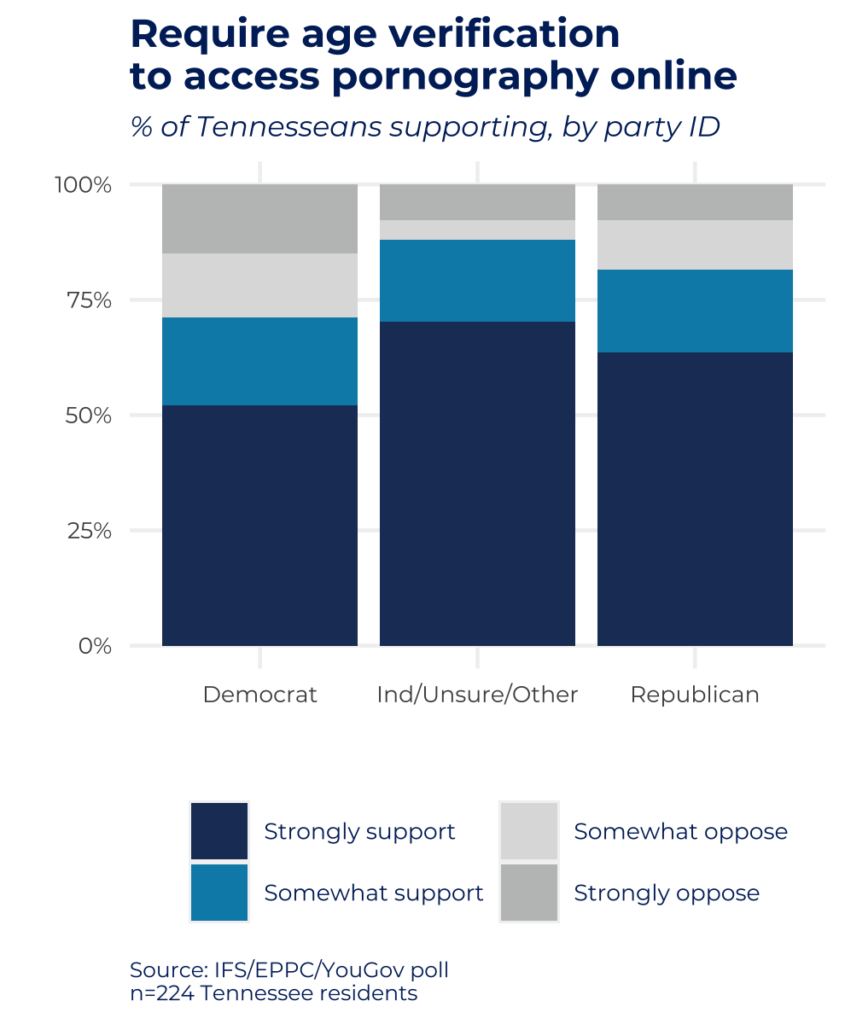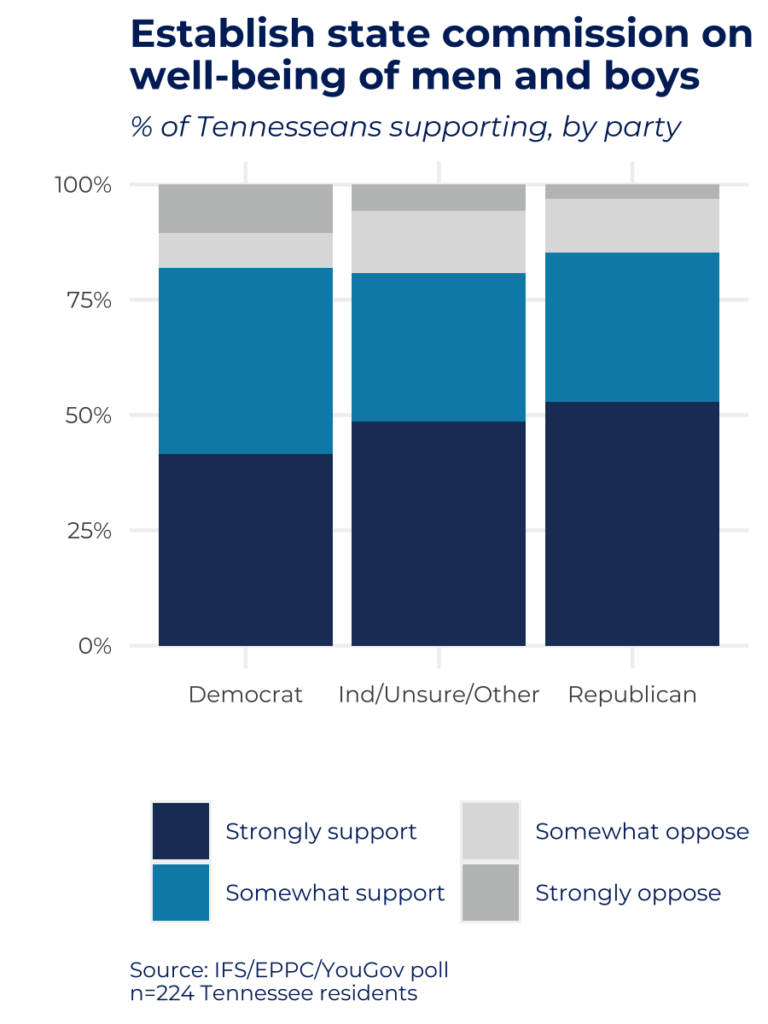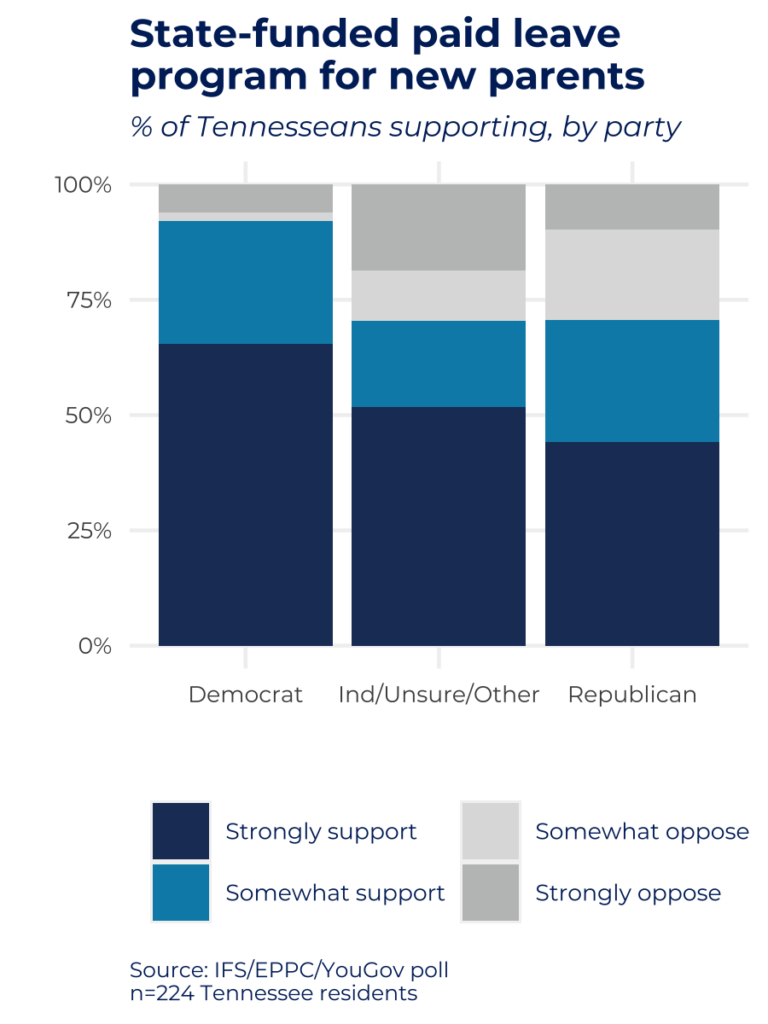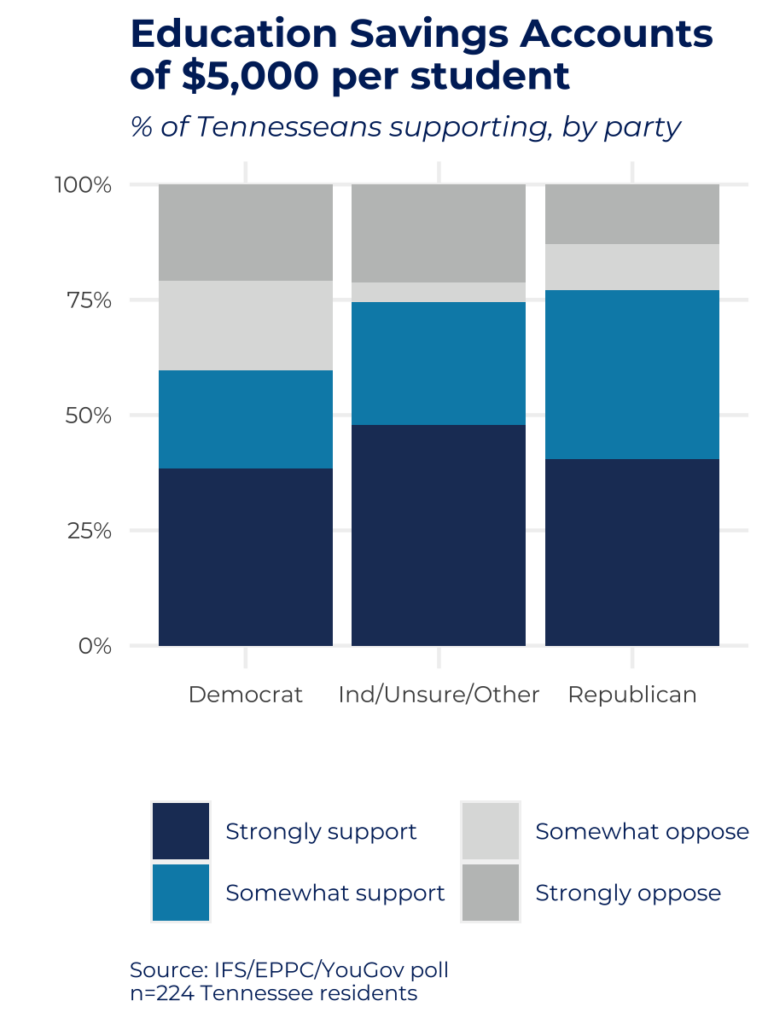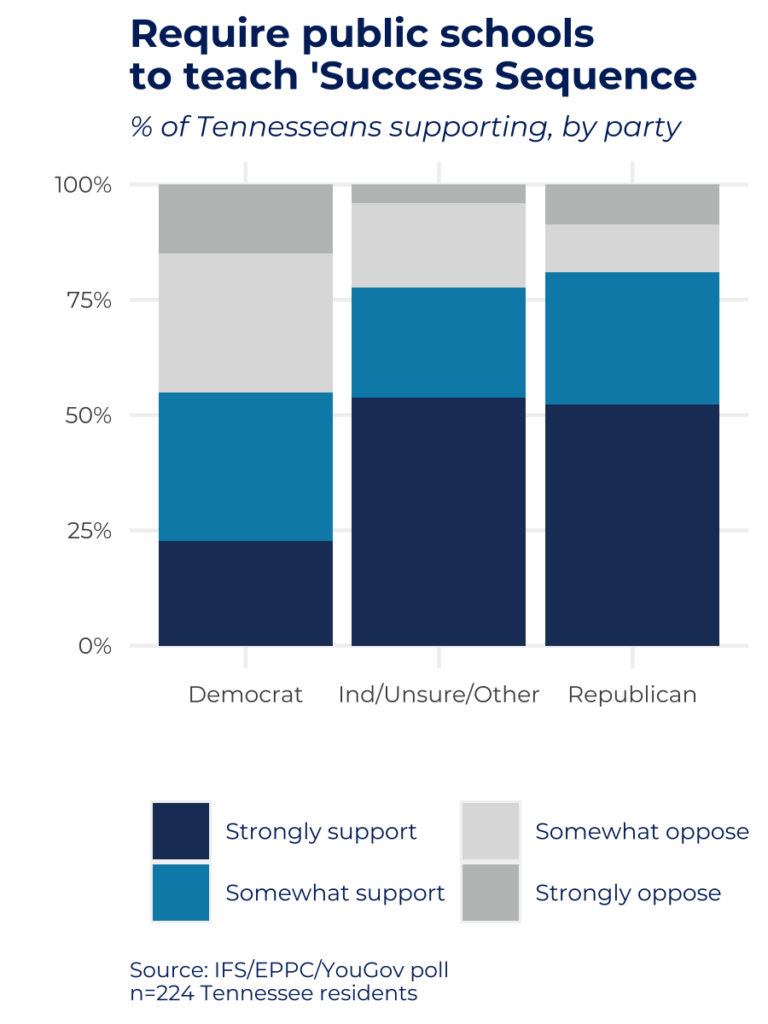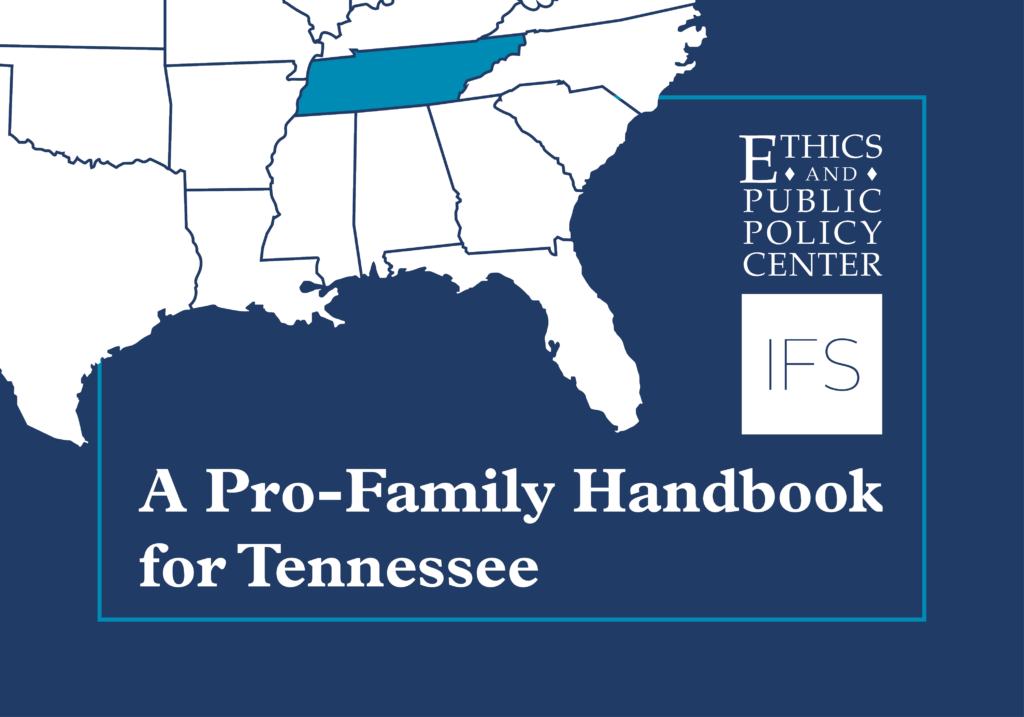
Published February 1, 2024
Introduction
The strength of a state is the strength of its families. Tennessee’s recent growth, dynamism, and promise has made the state a leader in attracting families. But families in Tennessee are not immune to the cultural and economic pressures that make it harder for parents and would-be parents to have and raise a family in the manner they deem best.
The Volunteer State has the potential and opportunity to pass policies that could make it the unquestioned best place in America to raise a family.
The Institute for Family Studies (IFS) and the Ethics and Public Policy Center (EPPC) recently commissioned a poll from YouGov, asking adults in five growing Sun Belt states about their views on policies that aim to support family life. This report focuses on policies for the Volunteer State that are not just politically popular, but can meaningfully advance the goal of making it easier to start and raise a family.
The five pro-family policy priorities highlighted in this report are:
(1) Empower parents to better protect their kids online
(2) Create a state commission on the well-being of men and boys
(3) Establish a Volunteer State New Parent Credit
(4) Expand early childhood, K–12, and after-school options for all parents
(5) Reorient school curricula to focus on long-term well-being
Empower parents to better protect their kids online
81% of Tennessee respondents support age verification to access porn
Parents of all political stripes agree it is too easy for children to find sexually explicit content online, and many parents worry about the long-term impact of a childhood intermediated by screens. In a national poll conducted last year, 86% of parents agreed it is “too easy” for kids to find explicit content online.
Across our five spotlight states—Florida, Georgia, North Carolina, Tennessee, and Texas—88% of Republican parents and 83% of Democratic ones agreed with a proposal to require users to verify their age before accessing websites that host sexually explicit content. In Tennessee, four-fifths of all adults somewhat or strongly supported the idea.
Tennessee lawmakers could pass a law requiring third-party verification that an individual is 18 years of age or older before being permitted to access a web site that is predominantly used to host prurient or explicit content. A step that could assuage concerns about privacy online would be utilizing a “zero-knowledge proof” approach, a cryptographic method that reveals no information about the user.
Age verification of sites that host pornography has already been passed in seven states: Louisiana, Texas, Arkansas, Virginia, Montana, Mississippi, and Utah. Most are currently facing legal review, but even without taking full effect have already led to direct action: PornHub, the twelfth-most-visited website in the world in June, voluntarily blocked access to users in certain states in protest of the new law.
Apart from the topic of pornography online, parents continue to wrestle with how to ensure their kids are engaging with social media and the Internet in healthy, not destructive, ways. Surveys show many parents feel overwhelmed by concerns over cyberbullying, mental health threats, and the broader negative effects of a childhood intermediated by screens. A University of Michigan poll of parents with school-age children found their top two concerns were overuse of devices (67%) and social media (66%). Championing legislation to strengthen parents’ ability to protect their children online should be a top priority.
Asking individual parents to be an expert on the plethora of user settings, filters, and options for keeping age-inappropriate content away from their kids places an undue burden on families. Many of today’s most popular apps, like TikTok and Snapchat, use algorithmic content and direct messaging that make traditional filters inadequate.
Policymakers should reset the status quo around kids and tech with a comprehensive approach to giving parents more power to protect their kids online. Of the parents we polled across the five states, only 17%—and 12% of Republican-leaning parents—said the problem of helping navigate kids and tech use was “not a problem government should try to solve.” Giving parents more power to help keep their kids safe online is a winning political issue that cuts across partisan lines.
Lawmakers could join Texas, Arkansas, Utah and Louisiana in passing a law requiring parental consent for a minor to be allowed to create an account on social media platforms. (Utah’s goes further, banning kids from using social media between the hours of 10:30 p.m. and 6:30 a.m.) They could also require that all social media platforms give parents administrator-level access to view what content their children are watching, and who they are communicating with. Like the age verification law, these laws will face legal challenges before being fully implemented, but many observers believe they are likely to be upheld in the long run.
Create a state commission on the well-being of men and boys
83% of Tennessee respondents support a state panel on the crisis facing men
Young men are now less likely to graduate from high school or college than women. Men, especially single or divorced men, are more likely to die from suicide or opioid-related causes. And these social dynamics contribute to delayed marriage, deferred parenthood, lower labor force participation, and a rising share of young men who are categorized as neither working, nor in education or training. Over the past three decades, the share of prime-age men in Tennessee (between 25 and 54 years old) not working or looking for work rose by 44 percent (from 8.6% to 12.4%).
The cultural and economic factors driving these trends can’t be solved overnight. But a state Commission on Men and Boys would offer a focused, serious effort to rejuvenate policy and cultural efforts aimed at helping at-risk young men mature into their place in society.
The Commission would look across the lifespan but focus on young and middle-aged adults who are struggling the most today. It would focus on cultural, educational, job, and social supports, and address policy issues such as reforming child support and alimony. It should start by investigating options—from more male teachers to more single-sex schools—to bridge the gender gap in educational performance. It would also be tasked with identifying opportunities to realign and re-envision career and technical education, often referred to as vocational ed, to ensure that all high school students, even those who don’t attend college or university, are given the tools they need to build a pathway to the middle class.
Its efforts would also include programs to reduce the number of absentee fathers, working with religious and non-profit organizations to develop outreach efforts to ensure dads have a relationship with their children. In 2022, Florida passed a bill that will devote $70 million to promoting “responsible and involved fatherhood” in the state. The initiative, launching this fall, will invest in mentorship, job training, relationship classes, and other social services aimed at improving the number of men who stay involved in their child’s life.
Part of this commission’s work would include a focus on the state of marriage in Tennessee. As recently as 1990, around one in four babies were born to unmarried mothers; today, that share is more than two out of every five children. Tennessee has had recent success in attracting in-migration, particularly in the post-Covid years, leading to more married couples moving into the state; but even this has only helped halt the gradual trend away from married parenthood, with 57.2% percent of children born to married parents in 2021.
This has long-term ramifications, particularly for young men who are more likely to grow up without a positive male role model in the home. Kids who grow up without two parents present are at risk for higher rates of academic struggles, health complications, involvement with the justice system, poverty, and other factors associated with social breakdown.
Part of the commission could also be tasked with evaluating the extent to which marriage penalties in state safety-net programs are discouraging young men from marrying. Fully solving marriage penalties is expensive, and best pursued at the federal level. But the state could explore taking steps towards reducing the impact of marriage penalties on low-income households by, where possible, easing the sharp cliffs that makes getting married a financial loser for too many parents. Offering a honeymoon period, where newly-married couples are able to maintain safety-net program eligibility for a year or two after marriage, could also help families adjust without abruptly cutting them off of benefits.
Establish a Volunteer State new parent credit
Three-quarters of Tennessee respondents support a state paid leave program
Fertility rates in the U.S. have been declining since 2007, and Tennessee is no exception. Even as Tennessee’s population grew from 6.2 to 6.9 million in from 2007 to 2021, the number of births in the state over that time dropped from 86,711 to 81,717. To put it another way, while the state’s population increased by 12.9 percent over a decade-and-a-half, the number of births in Tennessee dropped by 6.1 percent.
A straightforward New Parent Credit would respond to the demographic trends that are reducing fertility, the new political landscape around protecting unborn human life, and the economic reality that many new parents face resource constraints around the time of their child’s birth. It would put more money in parents’ pockets at the time when they need it most, allowing them to purchase necessities or construct a care arrangement as they see fit.
The credit would be structured as an advanced, refundable tax credit of $1,000 for married-parent households, and $500 for single parents, issued at the time they file for their child’s birth certificate. The Tennessee Department of Health would be instructed to incorporate the process for commissioning the payment into the child’s initial input into the vital records system, with the payment from the Department of Finance & Administration sent out shortly thereafter. Parents would be given the opportunity to opt out of the payments if they would prefer to apply the credit to next year’s personal taxes, should they so desire.
Research suggests a $1,000 credit would likely not be enough to dramatically alter the state’s fertility trajectory. But on the margins, it may make giving birth more attractive to some would-be parents. And its most important effect would be as a visible sign that Tennessee is a state that welcomes and supports life. Tennessee House Bill 2263 (the “heartbeat bill”) protected unborn life from the earliest weeks of conception. A New Parent Credit would recognize that those children who deserve the law’s protection while unborn should also receive the law’s support once they are born.
It would also give parents a little more financial peace of mind around childbirth. According to the National Partnership for Women & Families, about four-fifths of Tennessee workers do not have paid family leave; nearly two-thirds are ineligible for unpaid leave. But policymakers need not introduce a state-run paid leave program to give parents a little more flexibility. Indeed, many parents want a more flexible option.
A plurality of moms say that their “ideal” situation would be to have one parent work part-time, or even stay home, especially when their children are young. Paid leave programs leave out those moms, just as child care subsidies leave out those families who prefer to have a relative or neighbor watch their child. A New Parent Credit would give parents more money in their pocket to determine the work-life balance that is best for them.
Moreover, a state-wide New Parent Credit could be achieved for a relatively modest sum: at 2021 birth rates, a credit of $1,000 for married-parent households, and $500 for single parents, would cost the state $64.2 million. The cost could be further ameliorated, if desired, by introducing a claw-back provision for households making $200,000 or more on the following year’s income tax return (which would impact approximately 7.5% of new parents in Tennessee). Means-testing the credit on the front end, however, could dull its scope and impact.
In contrast to states like California and New Jersey, which have rolled out child tax credits that extend through adolescence and penalize married couples, Tennessee’s New Parent Credit would be a targeted investment that recognizes the state’s interest in having children born to married parents. It would celebrate the value of every newborn child without putting a government thumb on the scale towards one type of child care arrangement over another. And it would recognize that new parents face a variety of new expenses and demands, and that their children deserve a strong start.
Expand early childhood, K–12, and after-school options for all parents
70%+ of Tennessee respondents favor student-centered spending
Tennessee has been a leader in expanding parents’ choices in K–12 education; now it needs to make sure that choice is meaningful for children of all ages. Prioritizing parental choice, along with a new grant aimed at helping organizations launch or expand operations, could ensure a true diversity of early childhood and K–12 options across the state.
Because Tennessee has no state income tax, a traditional Child Tax Credit approach may be less feasible than other methods that seek to expand parents’ choices. The recently-enacted Education Savings Account Pilot Program is a major step in the right direction, and lawmakers should closely watch its forthcoming implementation and be prepared to expand it to serve children from across the state and more income brackets.
In early childhood, parents’ preferences vary widely. Some prefer to have a parent at home full-time, others prefer to have a relative or neighbor watch their children while parents work full- or part-time, still others prefer a faith-based or for-profit child care center. To the greatest extent possible, policymakers should try to expand parents’ options in early childhood, rather than assuming a one-size-fits-all approach.
According to a national poll conducted by the Bipartisan Policy Center, 31% of working-parent households used center-based care, and of those 53% used one that was affiliated with a faith-based organization. One-third of parents participating in center-based care said the religious orientation of the facility was “somewhat” or “very” important in their decision, according to a government survey. Therefore, any discussion of child care in Tennessee should include a focus on ensuring faith-based providers an essential part of the delivery system.
Additional grants to non-profit and religious organizations could help get a child care program off the ground, or technical assistance to ensure compliance with regulations and requirements could help them build out enough capacity to break even. Similarly, churches or community groups interested in expanding K–12 education could benefit from a start-up grant or technical assistance for ensuring that true choice is available to more families. This attempt at capacity building would help ensure a pluralistic landscape for Tennessee parents to find the early childhood and K–12 option that is right for them, without putting a thumb on the scale for center-based child care or other options.
An early childhood and primary education capital expansion grant would provide non-profit and community organizations a three-year, partially-forgivable grant aimed at retrofitting or expanding existing physical spaces (not new construction), covering teacher training or certification, acquiring technology or other approved capital expenses. They would not be intended to cover normal operating expenses, but to provide religious and non-profit providers access to capital to help launch their new or expanded early childhood, elementary, middle, or high school educational offerings. The grant should be made available to facilities that serve children across all age groups, though a portion of funds could be allocated specifically to child care if desired.
Another policy that polled well among Tennesseans was the idea of expanding support for after-school programs or extra-curricular activities—three-quarters of Democrat and Republican respondents both supported the idea. An education savings account could be an easy way to ensure all students, regardless of demographic background or school situation, could benefit and use tax-advantaged or state-provided funds to hire a tutor, enroll in music lessons, or cover fees associated with high school sports programs.
Additionally, the state of Utah successfully sought a waiver to its state’s Medicaid program, allowing family members who care for elderly relatives to receive financial compensation—a similar model could be adopted for relative-provided child care in the Tennessee Child Care Development Block Grant, giving parents more options in how to use their child care assistance.
Reorient school curricula to focus on long-term well-being
Three-quarters of Tennessee respondents favor teaching the ‘success sequence’
A state commission examining a potential crisis for men and a New Parent Credit to provide a meaningful bonus to new parents are both designed to recognize the importance of marriage. But falling marriage rates in Tennessee require a longer-term effort. As young people increasingly delay, defer, and opt out of marriage, studies find commensurably lower levels of happiness, and higher rates of loneliness, depression, and suicide.
Preparing young Tennesseans for the economy of the twenty-first century is important—but it is even more important to equip them to think about building strong families and healthy futures in an environment which is increasingly hostile to family life.
As social scientists have pointed out, certain habits and decisions are associated with long-term flourishing. Specifically, young adults are “60% less likely to be poor if they put marriage before the baby carriage.” Likewise, “97% of young adults who get at least a high school degree, work full time, and marry before having children avoid poverty in their late 20s and early 30s.” To help its citizens flourish, the state of Tennessee should embrace its responsibility to inform young people about these statistics, and encourage them to think about the long-term trajectory of their lives in ways that go beyond just career readiness.
The Tennessee Department of Education could be directed to require that state education incorporates a family life standard into curriculum standards that would teach that:
- A high school graduation, full-time work, and having children after marriage are linked to less poverty and greater prosperity for adults.
- Sequencing marriage before parenthood is associated with greater family (and thus financial) stability
- A stable, married family is linked to better educational, social, and emotional outcomes for parents and children, many of which are associated with more positive financial outcomes.
It could also include basic facts about fertility, work-life balance, home economics, happiness, and human flourishing. These topics could be incorporated into its health and safety high school graduation requirements or supplement its required units of career-focused electives. And informing students in high school about fetal development, such as when a heartbeat is detectable or when a fetus’ fingerprints form, could help underscore the state’s commitment to protecting the value of every human life.
The Department of Education and school districts could also be directed to collect student academic data by family structure, in addition to race and other demographic characteristics, to give researchers better insights into the value of a stable home environment on student achievement.
Lawmakers could also direct the Tennessee Department of Education to require that public schools create policies that restrict students from being on their phone in class, such as by physically relinquishing them at the classroom door or slipping them inside temporary pouches. This policy can give students space from the pressures of online socialization and allow them to focus on their academic work.
Patrick T. Brown is a fellow at the Ethics and Public Policy Center, where his work with the Life and Family Initiative focuses on developing a robust pro-family economic agenda and supporting families as the cornerstone of a healthy and flourishing society.
